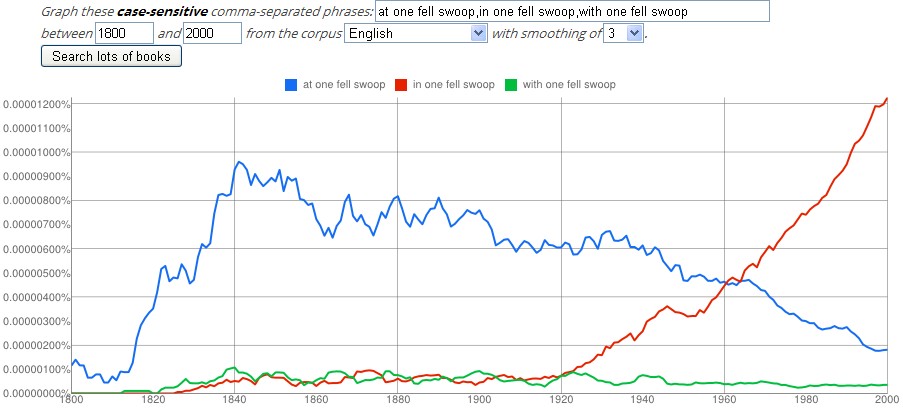Word Count
Writers Talk About Writing
Explaining "Fell" in "One Fell Swoop"
For years I've been reading the phrase at/in one fell swoop, and even using it occasionally, without ever examining it closely. I knew what it meant ("all at once"), and that it came from Shakespeare, but only recently did I stop and wonder: What's that fell doing there?
It begins, as far as we know, with Macbeth. In Act 4, Scene 3, Macduff finds out (spoiler warning) that his family has been murdered, and he says:
He has no children. All my pretty ones?
Did you say all? O hell-kite! All?
What, all my pretty chickens and their dam
At one fell swoop?
The image of a kite from hell swooping to kill defenseless chooks gives the sense of a sudden, fierce, merciless assault: this much is self-evident; the use of fell is more obscure.
Fell as an adjective has had several meanings over the centuries, most of them now obsolete or restricted to poetic, rhetorical, dialectal and idiomatic contexts. The oldest adjectival sense dates from the late 13th century: "fierce, cruel, ruthless; terrible, destructive," according to the OED. Thus did Shakespeare use it.
This fell came from Old French fel, from Middle Latin fello "villain, traitor." Its history overlaps with that of felon – once "wicked person" – and of felo de se "suicide." Skeat's Etymological Dictionary connects it to Celtic tongues, for example Irish feall "betray, deceive" and Breton falloni "treachery."
Over time, at one fell swoop softened and came to mean simply "all at once" or "in a single go" – that is, the connotations of viciousness and calamity faded. MWDEU says the idiom is now "neutral in application." We can do the housework, empty the dessert bowl, X all the Y at one fell swoop.
Variations have multiplied. Fell swoop becomes foul swoop, fowl swoop, fell stoop, fell stroke, full swoop, fail swoop, and so on. The meaning remains the same, more or less, but you might want to be careful of the variant adjectives unless your intent is to play or pun on the original. The preposition at is often in and sometimes with; indeed, a definite switch from at to in appears to be under way:
The trend is supported by data from the Corpus of Historical American English. You can click on the following graphs to see how the respective phrases have been used.
at one fell swoop:
in one fell swoop:
Some critics consider at one fell swoop a cliché. Like any set expression, though, it can be deployed to good effect when its particular sound and style suit your needs.
Graeme Donald, in The Dictionary of Modern Phrase, says it "properly applies to the sudden, savage attack of a bird of prey when it goes into its stoop." But not even Shakespeare used it that way: it has been metaphorical since birth.





